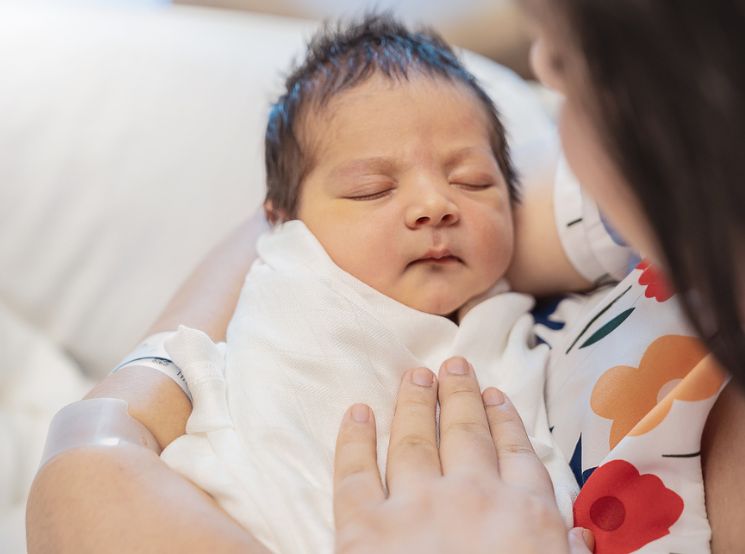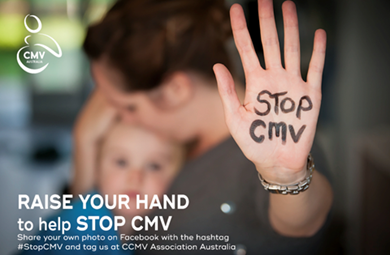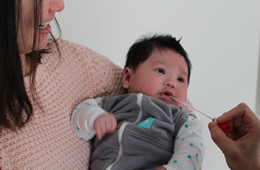Screen cCMV Project
- Project status: Active
Research area: Population Health > Prevention Innovation

Developing a fast and accurate bedside test to detect congenital Cytomegolovirus (cCMV) cost effectively in the first weeks of life.
Overview
What is cCMV?
Cytomegolovirus (CMV) is a common virus in the herpes virus family. Around half of people have been infected with CMV by young adulthood, and up to 85% by 40 years of age. CMV may stay dormant (inactive) in a person’s system for years, and ‘re-activate’ from time to time, but the person often remains well and knows nothing about it. Most people have no symptoms. For pregnant women who become infected with CMV for the first time, or if CMV re-activates during the pregnancy, there is a small risk that their baby will also be infected by CMV. This is called congenital CMV (cCMV). Most babies with cCMV remain well. However, some babies may develop deafness, vision problems and/or neurodevelopmental disability (such as cerebral palsy, learning and behavioural problems). We now know that cCMV may be treatable in some cases if detected in the first month of life. For more information visit the NSW Health website - Cytomegalovirus (CMV) and pregnancy fact sheet.
Overview of Screen cCMV project
Currently in Australia, there is no routine screening for cCMV at birth. This means cCMV often remains undetected, or is diagnosed too late for potential treatment.
Our group previously tested a targeted screening approach to detect cCMV in newborns who received a ‘refer’ result on their final newborn hearing screen, view the HearS-cCMV project for more information. This method of screening was feasible, acceptable and cost-neutral/saving. However, it only detected cCMV in those identified with potential hearing loss, and the PCR (polymerase chain reaction) test for cCMV was expensive and time-consuming to administer.
If a fast, cheap and accurate screening test were available, this would revolutionise how cCMV is detected, make potential treatment more accessible and pave the way to prevent deafness and cerebral palsy due to cCMV.
The Screen cCMV team is collaborating with the Walter and Eliza Hall Institute of Medical Research (WEHI) to test and validate a new, cheaper technology called CRISPR to test for cCMV. The CRISPR cCMV test works with saliva samples and may be available as a rapid bedside test.
In the first sub-study, GenV cCMV, the CRISPR cCMV technology will be tested through GenV (Generation Victoria), a whole-of-state birth cohort open to all babies and their parents over two years from October 2021. We will use a small portion of the saliva collected from babies who are part of GenV to test for cCMV. We will find out how common cCMV is. We may also be able to use information from GenV collected over time to find ways in the future to identify which babies with cCMV may require treatment or close monitoring.
In the second sub-study, HearS-cCMV 2, we will work with the Victorian Infant Hearing Screening Program (VIHSP), once the CRISPR cCMV test is validated, to test its use as part of normal clinical care at Victoria’s four largest maternity hospitals.
In the third sub-study, cost-benefit of cCMV screening, we will work with the University of Melbourne to determine the costs of targeted and universal cCMV screening. This will help guide the best method for cCMV screening in Australian newborns.
The Screen cCMV project is funded by a 5-year NHMRC Clinical Trial and Cohort Studies Grant (2006491).
Research team
The Screen cCMV team comprises researchers, hearing specialists and doctors across several organisations:
Murdoch Children’s Research Institute
- A/Prof Valerie Sung – Principal Investigator
- Prof Melissa Wake – Investigator
- Prof Richard Leventer – Investigator
- Prof Richard Saffery – Investigator
- Dr Margarita Moreno-Betancur – Investigator
- Prof David Amor – Associate Investigator
- Alanna Gillespie – Project Manager
The Walter and Eliza Hall Institute of Medical Research
- Prof Marc Pellegrini – Investigator
University of Sydney
- Prof Cheryl Jones – Investigator
- Dr Hayley Smithers-Sheedy – Associate Investigator
University of Melbourne
- Dr Xinyang Hua – Investigator
- A/Prof Lisa Hui – Investigator
- A/Prof Kim Dalziel – Associate Investigator
The Royal Children’s Hospital Melbourne
- Dr Zeffie Poulakis – Associate Investigator
Monash University
- Prof Marcel Nold – Associate Investigator
Children’s Health Queensland
- Rachel Beswick – Associate Investigator
Perth Children’s Hospital
- Dr Jafri Kuthubutheen – Associate Investigator
University of Oxford
- Seilesh Kadambari – Associate Investigator
Collaborators
The following institutions are key collaborators in this project:
- Murdoch Children’s Research Institute
- The Walter and Eliza Hall Institute of Medical Research
- University of Melbourne
The following studies and clinical groups are strongly linked with our team and play a big role in this project:
GenV (Generation Victoria)
GenV (Generation Victoria) is a research program inviting all Victorian babies born over two years from late 2021, and their parents. It collects a variety of consent, data and biosamples from participating children and their parents in their child’s first years of life. Our project uses a small part of the saliva samples collected from babies at recruitment to test for cCMV. This will enable us to determine how many Victorian babies have cCMV.
For more information visit the GenV website.
Victorian Infant Hearing Screening Program (VIHSP)
The Victorian Infant Hearing Screening Program screens the hearing of newborn babies born in Victoria in their first weeks of life. In the HearS-cCMV project, babies who had a ‘refer’ result on their final hearing screen were tested for cCMV.
For more information visit The Royal Children's Hospital Melbourne website - Victorian Infant Hearing Screening Program
Hearing Screening for congenital CMV (HearS-cCMV) project
The HearS-cCMV project piloted targeted screening for cCMV from late 2019 to early 2020 in Victoria’s four largest maternity hospitals:
- The Royal Women’s Hospital, Parkville
- Mercy Hospital for Women, Heidelberg
- Monash Medical Centre, Clayton
- Joan Kirner Women’s and Children’s Hospital, Western Health, Sunshine
We found it was feasible and acceptable to test for cCMV in newborns who had a ‘refer’ result on their final newborn hearing screen, using a parent-collected saliva swab. However, the clinical method of testing for cCMV was costly and time-consuming. Our HearS-cCMV 2 project will use a quicker and cheaper test. Testing will be performed in the same four hospitals in 2023-24.
Find out more about the HearS-cCMV project
Research
Project aims
This grant has three main aims, all tied to a smaller sub-study:
- To establish Population-based epidemiology by ascertaining Australian-first population data on newborn cCMV infection (cCMV prevalence) and child outcomes to age 2 years (2021-23) (HearS-cCMV)
- To trial point-of-care diagnostics by evaluating the use of CRISPR technology as a point-of-care clinical test for targeted newborn cCMV screening to facilitate treatment in the time-critical newborn period (2023-25) (HearS-cCMV 2); and
- To perform health economic analysis by analysing cost-effectiveness of universal and targeted postnatal screening strategies at a population level, utilising data from Aims 1 and 2 (2021-25) (Cost-benefit of cCMV screening).
Research Projects
We currently have a PhD project available to commence in 2023. Please see below for relevant details:
Investigating ‘silent’ newborn viral infections and outcomes in the GenV cohort
We are seeking a PhD candidate to examine the prevalence and outcomes of ‘silent’ newborn viral infections in the state-wide GenV cohort. This PhD offers exciting potential for significant discovery in Australia’s landmark cohort study, and a research career in population health, epidemiology, infectious diseases and/or child health and development.
Generation Victoria (GenV), Australia’s most ambitious longitudinal study, is a whole-of-state cohort targeting all 150,000 newborns born in Victoria Oct 2021-Oct 2023 and their parents, designed to explore how environmental exposures and genetics interact with biology to determine outcomes across the life course.
It is now known that viruses can establish lasting inflammatory/immune effects and/or dormant or low-grade persistence within infected individuals. Large-n population research is now showing paths from virus to disease, such as the recent discovery that Epstein-Barr virus (EBV) causes subsequent multiple sclerosis. There is reason for concern that newborn viruses could precede a range of life course conditions such as autism, allergy, schizophrenia, and immune disorders, over and above viruses already known to cause intellectual disability and deafness.
This project will build on a successful NHMRC grant (2021-25) with GenV and the Walter and Eliza Hall Institute (WEHI), which uses novel CRISPR gene-editing technology to determine the population prevalence of a single virus (congenital cytomegalovirus, cCMV) in GenV’s newborn saliva samples. This PhD will add to this body of research by identifying additional viruses to add to the testing panel, reporting the prevalence of ‘silent’ newborn viruses within a Victorian sample of newborns, and exploring child health/development outcomes in the first 2 years of life and beyond.
Supervisors: A/Prof Valerie Sung, A/Prof Gabrielle Haeusler, Professor Melissa Wake
Media, presentations & publications
Media
- Generation Victoria (GenV) – Shaping a new approach to treating cCMV
- 9 News, Melbourne researchers develop new test to easily identify dangerous common virus in babies, 16th September 2021
- Herald Sun feature article (front page) Sunday 4th July 2021: ‘Pregnancy shock: don’t kiss the kid: Bid to thwart leading cause of newborn disability’
- Media release on NHMRC grant success, Four research projects secure federal grants, 22nd June 2021
- 9 News Melbourne Twitter post, CMV in pregnancy 4th May 2021
- 9 News, Melbourne researchers develop new test to easily identify dangerous common virus in babies, 16th September 2021
Presentations
Our team recently presented a webinar about cCMV prevention at the Royal Children’s Hospital. The link and various other resources are available below.
Webinar: Can we eliminate the impacts of congenital CMV?
Key insights
-
- Cytomegalovirus is a common virus that can be a cause of developmental difficulties and childhood hearing loss if contracted in pregnancy. This is called congenital cytomegalovirus (cCMV).
- Hygiene precautions are effective in reducing the risk of CMV during pregnancy.
- Unfortunately, most pregnant women are unaware of cCMV and the prevention strategies that can make a difference.
- Screening for cCMV helps to support early detection and intervention for hearing loss and developmental delay.
Visit The Royal Children's Hospital Melbourne website to watch the webinar
 CMV Australia
CMV Australia
- Posters: 'Raise your hand to stop CMV' poster and 'Protect your baby from CMV' poster. View posters
- Short video: The 'What is CMV?' video provides simple strategies to help prevent CMV. Watch video
 Cerebral Palsy Alliance
Cerebral Palsy Alliance
- Free eLearning course for midwives and midwifery students: This free training provides information on how congenital CMV can affect babies as well as recommended prevention strategies. View course
- Short video: The video provides an overview of congenital CMV, including how common it is, how it is contracted in pregnancy, and how to reduce the risk of transmission. Watch video
- CMV resources: Download or order a variety of free pamphlets and posters in English and community languages. View resources
- cCMV Network Bulletin: Stay-up-to date with CMV awareness, education and research news. Sign up
 CHAMP resources
CHAMP resources
A series of resources from the Childhood Hearing Australasian Medical Professionals (CHAMP) network helps parents navigate the medical tests recommended for babies with newly diagnosed congenital hearing loss. Find out more about CHAMP.
Publications
- Webb E, Jones C, Sung V. Cytomegalovirus: the silent virus. MJA Insight+ 29th November 2021 https://insightplus.mja.com.au/2021/45/cytomegalovirus-the-silent-virus/
- Webb E, Jones C, Sung V. cCMV: The case for targeted infant screening Australia. 7 March 2022. https://doi.org/10.5694/mja2.51682
- Webb E, Gillespie AN, Poulakis Z, Gartland T, Buttery J, Casalaz D, Daley AJ, Donath S, Gwee A, Jacobs SE, Phuong LK. Feasibility and acceptability of targeted salivary cytomegalovirus screening through universal newborn hearing screening. Journal of Paediatrics and Child Health. 2022 Feb;58(2):288-94. https://onlinelibrary.wiley.com/doi/10.1111/jpc.15705
- Gillespie AN, Dalziel K, Webb E, Wong J, Jones CA, Sung V.. Targeted screening for congenital CMV: a micro-costing analysis. Journal of Paediatrics and Child Health. Accepted 2022 Sep
- Gillespie AN, Dalziel K, Webb E, Wong J, Jones CA, Sung V.. Targeted screening for congenital CMV: a micro-costing analysis. Journal of Paediatrics and Child Health. 2022 Oct.



